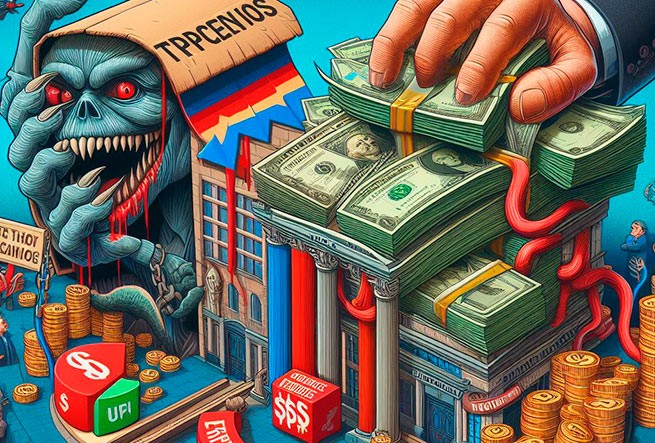The role of multinational corporations and their windfall profits in the rise in prices that has exploded in 2022 and reverberated around the world has been revealed by a report that examined the image of US and UK listed companies and highlighted the need for a global corporation tax to rein in excess profits. .
An analysis of the financial statements of many of the UK’s largest companies showed that profits far outpaced rising costs, contributing to rising inflation last year to levels not seen since the early 1980s.
The report, prepared by think tanks Institute for Public Policy Research (IPPR) and Common Wealth, states that thePortable profits increased by 30% among UK listed companies, with 11% of firms making excess profits based on their ability to drive excessive price increases – a move dubbed “greedflation” and a tactic that tends to take root. Excessive profits have been even greater in the United States, where many important sectors of the economy are dominated by a few powerful companies.
This surge in profits comes at a time when wage growth has failed to keep pace with inflation and workers have experienced the biggest drop in disposable income since World War II.
Guilty sectors of the economy
Following Russia’s invasion of Ukraine, energy companies ExxonMobil and Shell, mining companies Glencore and Rio Tinto, and food and raw materials firms Kraft Heinz, Archer-Daniels-Midland and Bunge saw their profits significantly exceed inflation, the researchers said.
“Because energy and food prices weigh so heavily on spending across all sectors of the economy, the initial price shock was compounded, helping inflation peak higher and last longer than if market power had been less,” the report said. .
Analyzing the financial statements of 1,350 companies listed on stock exchanges in the UK, US, Germany, Brazil and South Africa, the report’s authors claim that firms in the technology, telecommunications and banking sectors also achieved significant price increases, which increased their profitability. “These companies were able to protect or even expand their margins while generating excess profits due to a combination of strong market power and global market dynamics,” the study adds.
Carsten Jung, chief economist at IPPR, said work by Isabella Weber, an economist at the University of Massachusetts, showed how “systemic sectors” can have an outsized influence on economy-wide inflation.
The report echoes research from union Unite which found last year that the biggest price rises impacting the UK consumer price index (CPI) occurred in companies that either maintained or improved their profit margins. Among the companies that increased their profits more than average before the pandemic, there were:
- ExxonMobil: profit rose from 17.55 billion euros to 62 billion euros.
- Shell: profit of 18.72 billion euros increased to 51.48 billion euros
- Glencore: from 2.22 billion euros to 17.3 billion euros
- Archer-Daniels-Midland: from 1.6 billion euros to 3.7 billion euros.
- Kraft Heinz: from 310 million euros to 2.1 billion euros.
Concentration and excess profits
Four food companies, publicly listed Archer-Daniels-Midland and Bunge, and privately held Cargill and Dreyfus control about 70-90% of the world grain market. “This has caused significant damage to the economy as a whole. – the report says. – World GDP could be 8% higher than it is now if market power had not increased. Labor incomes are likely to be significantly lower and economic momentum weaker. This implies poorer choice, lower quality products and less economic opportunity than in a world where large companies were less dominant.”
Some members of the US central bank, the Federal Reserve, acknowledged that the price increases were driven by a desire to boost profits. For example, Isabelle Schnabel, a member of the executive board of the European Central Bank, said last year that “on average, recent incomes have made a decisive contribution to overall domestic inflation, exceeding their historical contribution.”
Jung and Common Wealth economist Chris Hayes stressed the need to introduce excess profits tax, amounting to approximately $4 billion, along with measures to eliminate monopolistic practices that allow companies to exploit their market power. While Jung noted that the Bank of England had been left out of the debate and would have to “catch up”







More Stories
What's Happening to America's Presidential Candidates (Video)
Who is he, the killer Farion?
What's happening on Athos? Will there be an assault on Esphigmenou?